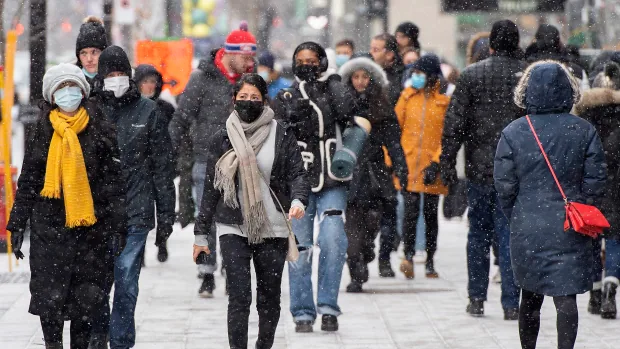This is an excerpt from Second Opinion, a weekly roundup of health and medical science news emailed to subscribers every Saturday morning. If you haven’t subscribed yet, you can do that by clicking here.
Omicron is ramping up the push for widespread boosters in Canada, shifting the conversation away from providing added protection to the most vulnerable and toward giving everyone eligible an additional shot to stave off potential spread of the highly transmissible variant.
Canada has seen dozens of omicron cases emerge in the two weeks since the variant was first identified, and new data from around the world has public health officials on high alert for signs of wider spread here.
But while there is growing concern about the threat of omicron as we learn more about it in real time, there are also early, hopeful signs that it may not cause as severe illness as previous variants and that boosters may be effective at slowing its spread.
A new report from the U.S. Centers for Disease Control and Prevention found that out of the 43 omicron cases identified in 22 states in early December, just one person needed a brief hospital stay, and there were no reported deaths from the variant.
WATCH | Omicron spreading faster than delta but may be milder, early data suggests:
Initial evidence about the omicron variant seems to suggest that the strain is more transmissible but less severe than the delta variant. But scientists studying omicron caution that understanding the full threat of omicron will take more time. 1:59
“We are seeing fewer symptoms so far with omicron, and it almost certainly has a lot to do with the fact that people have some degree of immunity,” said Deepta Bhattacharya, an immunologist at the University of Arizona.
“But I don’t think there’s any doubt that omicron has more immune-evasive properties than delta … so you can imagine that omicron would have more of an advantage spreading in places where people already have some immunity than with delta.”
South Africa reported a near-record high in daily infections this week, but scientists have not yet seen evidence that omicron is causing more serious illness, which could either be a sign of things to come or a delay in the true impact it will have there.
“The severity does not look very high, which is good, but the infected population is skewing young and so would be expected to have milder infections,” said Bill Hanage, an epidemiologist at the Harvard T.H. Chan School of Public Health in Boston.
“The real concern is unvaccinated populations.”
A new report from the U.K. confirmed widespread community transmission of omicron and a higher rate of re-infections and household outbreaks compared to delta — with more than one million omicron cases projected in the next month.

Yet the report also found booster shots provided an estimated 70 to 75 per cent protection against mild disease from omicron, giving the first real-world glimpse at the benefit offered by third doses in the face of the fast-spreading variant.
“While the data isn’t perfect, and of course there’s still a lot of questions that remain, all the arrows are pointing in the direction that two doses of a vaccine will still be very helpful — but three doses of a vaccine will be better,” said Dr. Isaac Bogoch, an infectious diseases physician and member of Ontario’s COVID-19 vaccine task force.
“There should be a sense of urgency to roll out third doses, especially now as we have a holiday season upon us and we’re going to have a growing number of omicron cases in the country.”
Omicron spreading rapidly in Canada
The Public Health Agency of Canada (PHAC) released new modelling data Friday showing COVID-19 levels could spike in the coming weeks amid an ongoing wave of delta infections and the growing threat of omicron as the holidays rapidly approach.
Health officials in Ontario confirmed omicron now makes up 10 per cent of all positive cases in the province and could soon become the dominant circulating strain.
In Quebec, officials are investigating two potential omicron exposures at a gym and community centre in Montreal — with 14 cases of the variant detected in the city so far — but have said there is no evidence yet of wider community transmission.
British Columbia announced plans to expand its booster-shot program this week as officials reported several new cases of omicron, while Saskatchewan recently expanded shots to those 50 and over, as four omicron cases emerged there.
But as new data pours in from Canada and globally on omicron’s ability to rapidly transmit and partially evade immunity from vaccination and prior infections, early signals hint that vaccines will still provide significant protection from hospitalization and death.
Pfizer-BioNTech announced results from laboratory data this week that found three doses of its COVID-19 vaccine effectively neutralized omicron, adding fuel to the fire for the expansion of boosters to fight the new variant.
WATCH | Pfizer says booster shots effective against omicron variant in early findings:
Pfizer-BioNTech have reported early findings that show three doses of their COVID-19 vaccine are more effective than two when it comes to neutralizing the omicron variant in lab settings. The World Health Organization cautioned against jumping to conclusions, saying the unvaccinated should get their first doses before worrying about third shots. 2:30
But what gained far less attention was the fact that two doses of the vaccine still offered strong protection against severe COVID-19, meaning a surge in omicron cases in highly vaccinated countries, like Canada, may not lead to an overwhelmed health-care system.
“The fact that the two-dose regimen of Pfizer holds up against what really counts — serious disease — that’s really good news,” said Dr. Amesh Adalja, an infectious disease physician and a senior scholar at the Johns Hopkins Center for Health Security in Baltimore.
“People have gotten very focused on cases and preventing all infections, but I think it’s really important to prevent severe infections.”
Pfizer’s early data analyzed the blood of vaccinated individuals against omicron and found a 40-fold decrease in the level of neutralizing antibodies, which prevent the virus from entering cells. A third dose increased them by a factor of 25.
“When you hear about a 40-fold drop in neutralizing antibodies, that doesn’t mean a 40-fold drop in how well the vaccines are going to work — I would be shocked if that were the case,” said Bhattacharya.
“So will two doses, in all likelihood, substantially reduce the likelihood you will get really sick? Yes. But is there room for improvement? Yes, definitely.”
‘Rapid pivot’ to widespread boosters needed
The National Advisory Committee on Immunization (NACI) strongly recommended earlier this month that all Canadians over 50 get a booster, while those aged 18 to 49 can be offered one six months out from their second shot.
But while most provinces and territories have expanded the rollout of boosters to more age groups, only a handful have gone below the age of 50 — including Manitoba, the Northwest Territories, Yukon and soon, Ontario.
“A rapid pivot is needed in the context of growing omicron cases in the country and what we’re seeing all the data point to from around the world,” said Bogoch. “We need to roll out third doses faster.”
Canada has an opportunity to get “two steps ahead” of an omicron-driven surge by expanding boosters to all Canadians over 18 who are six months out from their second dose, Bogoch said, which would help “blunt the size of another wave.”
“How bad is it going to be here? I think we should be prepared for another wave — an omicron-driven wave of infection,” said Anne-Claude Gingras, a professor of molecular genetics at the University of Toronto.
“I have no idea if that’s going to be a wave of hospitalization and an increase in the death rate as well — but at least in terms of spread, I think if we let it in, it will.”

Dr. Peter Hotez, dean of the National School of Tropical Medicine at Baylor College of Medicine and co-director of the Texas Children’s Hospital Center for Vaccine Development, says we’ll no doubt see a rise in omicron cases that could be made worse by delta.
“I think, at least for a while, we will have sort of a twin epidemic of delta and omicron,” he said. “But whether you’re worried about delta or omicron — the approach you take is the same.”
Getting a booster when it’s available to you, not relying on previous COVID-19 infection for protection and getting kids vaccinated will help protect people from the spread of omicron, he said, in addition to masking, increasing ventilation and limiting gatherings.
But experts agree boosters alone won’t spare Canada from the threat of omicron — even if they will likely have some added benefit to stopping spread.
“If you boosted everybody that needed to be boosted, it wouldn’t change the trajectory of the pandemic,” said Adalja. “It’s first and second doses that change the trajectory of the pandemic.”
More than 20 per cent of eligible Canadians still aren’t doubly vaccinated — and that number sits at closer to 40 per cent in the U.S., meaning large swaths of the population remain unprotected if omicron does take off.
“We’re not going to boost our way out of the pandemic,” said Bogoch. “But if you can blunt transmission with a third dose, you’d be doing something very helpful.”























Discussion about this post